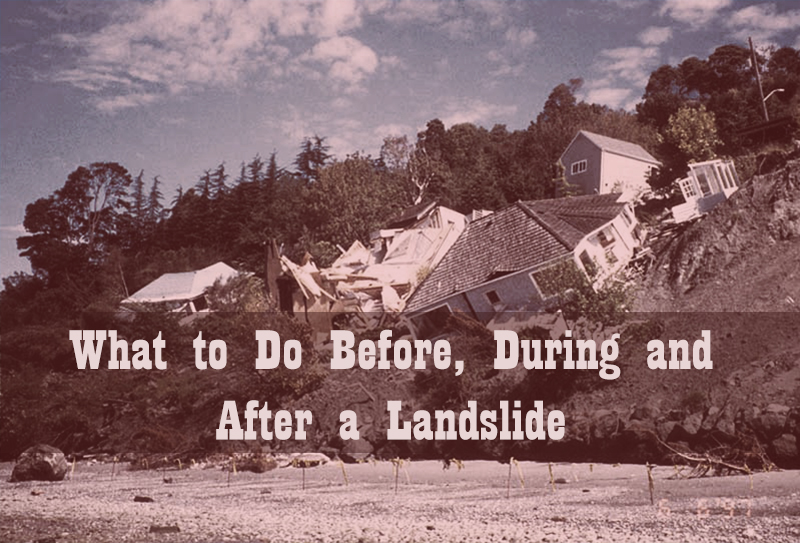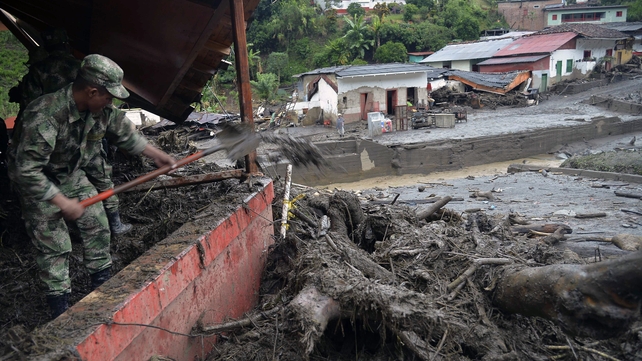Before the Landslide
Develop landslide-specific planning. Learn about landslide risk in your area. Contact local officials or departments of natural resources, and university departments of geology. Landslides occur where they have before, and in identifiable hazard locations. Ask for information on landslides in your area, specific information on areas vulnerable to landslides, and request a professional referral for a very detailed site analysis of your property, and corrective measures you can take, if necessary. If you are at risk from landslides
- Develop an evacuation plan. You should know where to go if you have to leave. Trying to make plans at the last minute can be upsetting and create confusion.
- Discuss landslides and debris flow with your family. Everyone should know what to do in case all family members are not together. Discussing disaster ahead of time helps reduce fear and lets everyone know how to respond during a landslide or debris flow.

- Stay alert and awake. Many debris-flow fatalities occur when people are sleeping. Listen to early warning of intense rainfall. Be aware that intense, short bursts of rain may be particularly dangerous, especially after longer periods of heavy rainfall and damp weather.
- If you are in areas susceptible to landslides and debris flows, consider leaving if it is safe to do so. Remember that driving during an intense storm can be hazardous. If you remain at home, move to a second story if possible. Staying out of the path of a landslide or debris flow saves lives.
- Listen for any unusual sounds that might indicate moving debris, such as trees cracking or boulders knocking together. A trickle of flowing or falling mud or debris may precede larger landslides. Moving debris can flow quickly and sometimes without warning.
- If you are near a stream or channel, be alert for any sudden increase or decrease in water flow and for a change from clear to muddy water. Such changes may indicate landslide activity upstream, so be prepared to move quickly. Don’t delay! Save yourself, not your belongings.
- Especially alert when driving. Embankments along roadsides are particularly susceptible to landslides. Watch the road for collapsed pavement, mud, fallen rocks, and other indications of possible debris flows.

- Stay away from the slide area. There may be danger of additional slides
- Check for injured and trapped persons near the slide, without entering the direct slide area. Direct rescuers to their locations.
- Help a neighbour who may require special assistance – infants, elderly people, and people with disabilities. Elderly people and people with disabilities may require additional assistance. People who care for them or who have large families may need additional assistance in emergency situations.
- Listen to local radio or television stations for the latest emergency information
- Watch for flooding, which may occur after a landslide or debris flow. Floods sometimes follow landslides and debris flows because they may both be started by the same event.
YOU MAY ALSO WANT TO READ: 20 Urban Survival Mistakes You Need to Stop Making ASAP
- Look for and report broken utility lines to appropriate authorities. Reporting potential hazards will get the utilities turned off as quickly as possible, preventing further hazard and injury.
- Check the building foundation, chimney, and surrounding land for damage. Damage to foundations, chimneys, or surrounding land may help you assess the safety of the area.
- Replant damaged ground as soon as possible since erosion caused by loss of ground cover can lead to flash flooding.
- Seek the advice of a geotechnical expert for evaluating landslide hazards or designing corrective techniques to reduce landslide risk. A professional will be able to advise you of the best ways to prevent or reduce landslide risk, without creating further hazard.
Source: saarc-sadkn.org
Self-sufficiency and Preparedness solutions recommended for you:
Food for Freedom (If I want my family to survive, I need my own food reserve)
Liberty Generator (How to gain complete energy independence)
Alive After the Fall (Build yourself the only unlimited water source you’ll ever need)
Blackout USA (EMP survival and preparedness guide)


